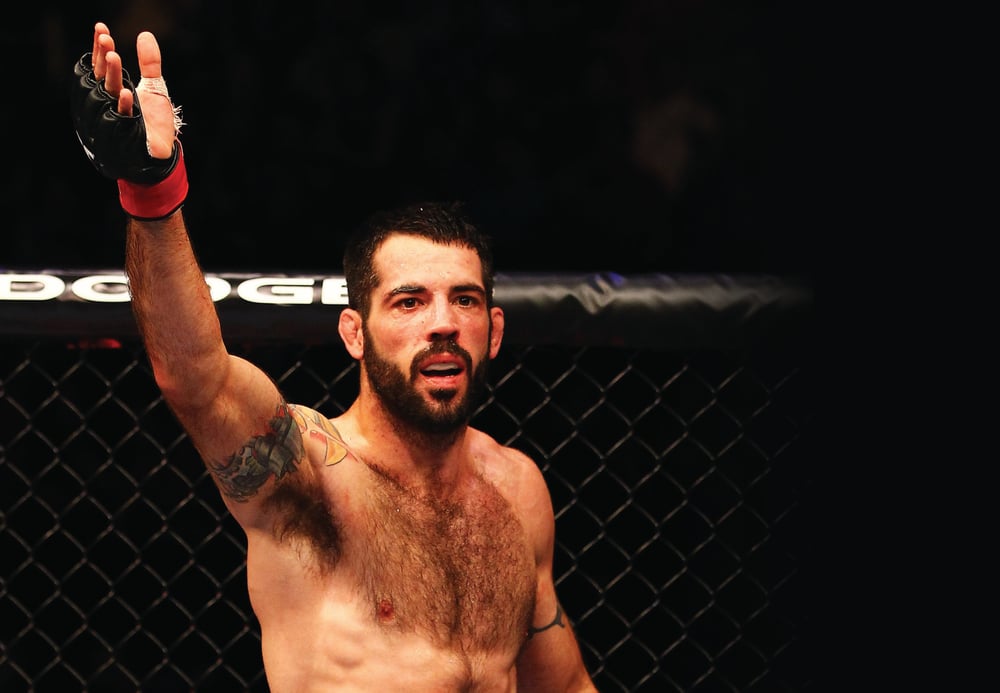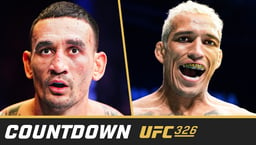
Issue 131
August 2015
Is being tough simply a question of genetics or can it be taught? FO bites down on its mouthguard to investigate...
FC welterweight Matt Brown is just one athlete who springs to mind when one considers mental toughness in mixed martial arts. ‘The Immortal’ is a fighter in every sense of the word. Boasting a seemingly bottomless gas tank, a rock-solid chin and a relentless approach – he’s got heart to spare.
Frankie Edgar too. How many times have we seen the New Jersey featherweight fight through adversity to force his way back into a fight?
But is that grit and determination to persevere god given? Is being brave and single-mindedly dogged something you’re born with or – like a left hook, double-leg or armbar – can it be taught, and then, with time and effort, perfected?
To truly succeed inside the rings and cages of the world’s MMA promotions, heart and determination is essential. In order to compete at the highest level and fully achieve your athletic potential, you’ve got to have the fortitude to endure and push through the most challenging situations.
But the old cliché that someone is ‘born a fighter’ may be a myth. At least according to mental sports coach Dr Patrick Cohn, who during his career has worked with a wealth of the East Coast’s leading athletes across a spectrum of sports.
Owner of Peak Performance Sports, Cohn believes mental toughness can indeed be taught. And he believes he’s got some tips that can help transform talent and potential into championship results.
“The reality is, mental toughness is not something you have, it’s something you do. Mental toughness is a skill, and skills can be developed. Mental toughness is learnt, just like its opposite – fear,” Cohn says.
“In fact, we are born with only two fears: fear of falling and fear of loud noises. All other fears are learnt. If we learn fear, we can learn its opposite – mental toughness.”

Mental toughness myths
According to Dr Cohn, who made his name working with the stars of the PGA Tour before crossing into other sporting fields, there are four faulty assumptions athletes make about mental toughness:
- Mentally tough athletes perform successfully in the clutch every time.
- Since I fall apart under pressure, I will fall apart under pressure every time.
- Mental toughness is an inborn characteristic.
- Either an athlete is mentally tough or they aren’t.
“Mental toughness is a developed skill that allows athletes to push through difficult circumstances without losing confidence and the ability to play at peak levels during crunch-time,” Cohn adds.
“You see a few basketball players with the knack of sinking the buzzer beaters to win the game, those special baseball players that hit clutch walk-off hits in extra innings or the soccer goalkeeper who is able to make the critical game-saving stop to secure victory. Those are all signs of mental toughness.”
So, the big question is, how can a mixed martial artist develop mental toughness? Is it just a case of watching old Wanderlei Silva fights and going hard in the gym – blood, sweat and tears left on the mats? Not quite.
Cohn adds: “First of all, mental toughness is not an all-or-nothing proposition. There are varying degrees of mental toughness. So when you’re developing your mental toughness, you need to realize the process doesn’t happen overnight, but is well worth the investment.
“Think of physical strength. Physical strength or building muscle requires resistance or weight training. Mental muscle is developed the exact same way by overcoming resistance, obstacles or challenges.
“By developing a mental training regimen, taking daily action and having patience, you will be on your way to becoming a mentally tougher athlete.”
MENTAL TOUGHNESS TOP TWO TIPS
Dr Cohn’s top tips to help to build your mental strength
1. Define what mental toughness means to you. Select one or two characteristics that you want to improve – managing emotions, breaking out of your comfort zone, letting go of mistakes. Create a written plan for improvement. Name specific methods and strategies you’ll use to further develop these specified areas.
2. Create a scoring system to evaluate your progress. How exactly will you measure your progress and how often? You can use a letter or number grade once a week or grade yourself after each practice.
Cohn adds: “Remember that improving your mental toughness is a process. Some days, you may revert back to your old patterns. That is a part of growth. Regroup and work your plan.”










